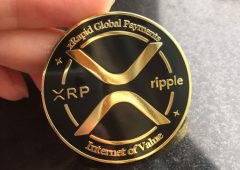Metaplanet Plans Massive Bitcoin Expansion for 2025
05.01.2025 15:00 1 min. read Alexander Zdravkov
Metaplanet, a rising force in Japan's Bitcoin ecosystem, is charting an aggressive course for 2025 with plans to grow its holdings to 10,000 BTC.
CEO Simon Gerovich shared the company’s bold vision, underscoring its focus on leveraging Bitcoin as the cornerstone of its strategy.
In 2024, Metaplanet made significant strides, amassing 1,762 BTC, valued at over $170 million. Its largest purchase came in December, acquiring 620 BTC at an average price of $96,000.
These acquisitions propelled the company to new heights, establishing it as a leader in Asia’s Bitcoin treasury space and driving a stock surge of 2,629%. Metaplanet also achieved profitability for the first time since 2017, cementing its reputation as a transformative player in the market.
To fund its ambitious goals, Metaplanet plans to rely on financial tools like loans and convertible bonds, which were pivotal in its 2024 strategy. While increasing Bitcoin reserves remains a priority, the company is also exploring ways to boost Bitcoin adoption in Japan, aiming to enhance its impact within the ecosystem.
The broader market trend of institutional adoption underscores Metaplanet’s strategy. Companies like MicroStrategy have set the tone, with significant Bitcoin purchases driving a record $78 billion in crypto market inflows in 2024. As Metaplanet gears up for its next phase of growth, it seeks to solidify its position as a major player in the global Bitcoin landscape.
-
1
Bitcoin: What to Expect After Hitting a New All-time High
10.07.2025 14:00 2 min. read -
2
Peter Brandt Issues Cautious Bitcoin Warning Despite Bullish Positioning
10.07.2025 20:00 2 min. read -
3
Standard Chartered Becomes First Global Bank to Launch Bitcoin and Ethereum Spot Trading
15.07.2025 11:00 1 min. read -
4
Vanguard Now Owns 8% of Michael Saylor’s Strategy, Despite Calling BTC ‘Worthless’
15.07.2025 17:09 2 min. read -
5
What’s The Real Reason Behind Bitcoin’s Surge? Analyst Company Explains
12.07.2025 12:00 2 min. read
Global Money Flow Rising: Bitcoin Price Mirrors Every Move
Bitcoin is once again mirroring global liquidity trends—and that could have major implications in the days ahead.
What is The Market Mood Right Now? A Look at Crypto Sentiment And Signals
The crypto market is showing signs of cautious optimism. While prices remain elevated, sentiment indicators and trading activity suggest investors are stepping back to reassess risks rather than diving in further.
What Price Bitcoin Could Reach If ETF Demand Grows, According to Citi
Citigroup analysts say the key to Bitcoin’s future isn’t mining cycles or halving math—it’s ETF inflows.
Is Bitcoin’s Summer Slowdown a Buying Opportunity?
Bitcoin may be entering a typical summer correction phase, according to a July 25 report by crypto financial services firm Matrixport.
-
1
Bitcoin: What to Expect After Hitting a New All-time High
10.07.2025 14:00 2 min. read -
2
Peter Brandt Issues Cautious Bitcoin Warning Despite Bullish Positioning
10.07.2025 20:00 2 min. read -
3
Standard Chartered Becomes First Global Bank to Launch Bitcoin and Ethereum Spot Trading
15.07.2025 11:00 1 min. read -
4
Vanguard Now Owns 8% of Michael Saylor’s Strategy, Despite Calling BTC ‘Worthless’
15.07.2025 17:09 2 min. read -
5
What’s The Real Reason Behind Bitcoin’s Surge? Analyst Company Explains
12.07.2025 12:00 2 min. read


